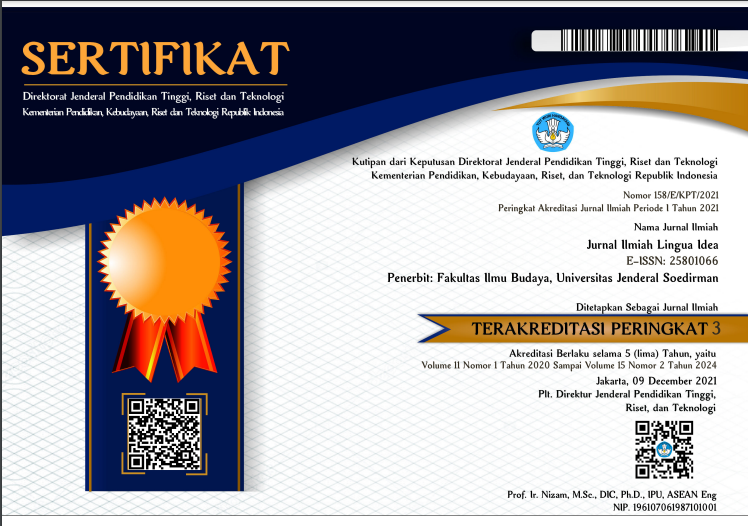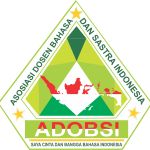Development of High Order Thinking Skills Based Assessment Tools in Pancasila Course: Critical Digital Citizenship Oriented
Abstract
The purpose of this research and development is to develop a HOTS-based assessment tool oriented to critical digital citizenship on Pancasila as an ethical system and Pancasila as the basis for developing science and technology, namely the production of an assessment tool that focuses on higher-order thinking skills (HOTS) in students. The method used in this research is the type of development research (R&D) with stages of market needs analysis, development, testing, and product revision. The form of the implementation of this research can be described as (1) workshop on analysis of Pancasila course curriculum (learning outcomes, material substance, assessment tools that have been developed; (2) workshop on development of HOTS-based assessment tools in Pancasila courses oriented towards critical digital citizenship ; (3) FGD expert validation; (4) trial of HOTS-based assessment tool in Pancasila course is oriented towards critical digital citizenship; and (5) preparation of the final research report. The results of this research and development that is based on expert assessment (expert) to the assessment tool were developed which got a mean score of 3.6 in both categories so that used for the assessment process. Based on the results of trials and reflections on the HOTS-based assessment tool oriented to critical digital citizenship, it was found that, First, students are happier when learning uses audio-visual. Second, the learning video assessment tool makes them better understand in analyzing phenomena that occur in society related to the actualization of Pancasila values in their daily lives and environment. Third, the questions contained in the video make students think critically. Fourth, this learning video makes students understand and realize that there are still many students ignorant in their actions to be able to apply the values of Pancasila.
References
Avargil, S. Herscovitz, O. & Dori, Y. J. (2012). Teaching Thinking Skills In Context-Based Learning: Teachers’ Challenges and Assessment Knowledge. Journal: Science Education Technology.
Bloom, B.S., Engelhart, M.D., Furst, E.J., Hill, W.H., dan Krathwohl, D.R. (1956). The Taxonomy of Educational Objectives The Classification of Educational Goals, Handbook I: Cognitive Domain. New York: David McKay.
Chan, C., Lei, W., & Lena, X. (2014). A Study of Video Effects on English Listening Comprehension. Studies in Literature and Language, 8(2), 53–58. https://doi.org/10.3968/4348.
Fitriani, D., Suryana, Y., & Hamdu, G. (2018). Pengembangan Instrumen Tes Higher-Order Thinking Skill pada Pembelajaran Tematik Berbasis Outdoor Learning di Sekolah Dasar Kelas IV. Indonesian Journal of Primary Education, 2(1), 87-96. https://doi.org/10.17509/ijpe.v2i1.13752.
Gunawan, I; Palupi, Retno Anggarini. 2012. Taksonomi Bloom-Revisi Ranah Kognitif: Kerangka Landasan Untuk Pembelajaran, Pengajaran, Dan Penilaian. Premere Educandum Jurnal Pendidikan Dasar Dan Pembelajaran Volume 2 Nomor 2.
Heong, y. et.al. (2011). The Level Marzano Higher Order Thinking Skills Among Technical Education Students.Journal: International of Social Science and Humanity.
Hosnan, M. (2014). Pendekatan Saintifik Dan Konstektual Dalam Pembelajaran Abad 21: Kunci Sukses Implementasi Kurikulum 2013.Bogor: Penerbit Ghalia Indonesia.
Kodriana, W., Mulyana, E. H., & Nugraha, A. (2017). Pengembangan Soal Tes Berbasis HOTS pada Outdoor Learning di Sekolah Dasar. PEDADIDAKTIKA: Jurnal Ilmiah Pendidikan Guru Sekolah Dasar, 4(1), 61- 72.
Mukminan. (2015). Kurikulum Masa Depan. Universitas Sultan Ageng Tirtayasa, Banten, Indonesia.
Rahmah, A. N., & Muharni, L. P. J. (2019). Identifikasi Soal Tipe Higher Order Thinking Skills (HOTS) Pada Buku Matematika Materi Persamaan dan Pertidaksamaan Linear Satu Variabel. Edu Math Journal Prodi Pendidikan Matematika, 7(1), 1-8.
Subay, R. (2020). Pengembangan Assessment Tes Higher Order Thinking Skills (Hots) Peserta Didik Pada Pembelajaran Matematika Kelas Vii Berbasis Model Rasch. Tesis. Universitas Negeri Semarang: Prodi Penelitian dan Evaluasi Pendidikan.
Sugrue, B. (1995). A theory-based framework for assessing domain-specific problem-solving ability. Educational Measurement: Issues and Practices, 14(3), 29−36.
Widodo. (2010). Analisis Butir Soal Tes. Jurnal Pendidikan Penabur No. 14/Tahun ke-9/ Juni 2010 SDK BPK Penabur. Diakses tanggal 4 Oktober 2020.
Authors who publish with Jurnal Ilmiah Lingua Idea agree to the following terms:
- Authors retain copyright and grant the journal right of first publication with the work simultaneously licensed under a Creative Commons Attribution License (CC BY-SA 4.0) that allows others to share the work with an acknowledgment of the work's authorship and initial publication in this journal.
- Authors are able to enter into separate, additional contractual arrangements for the non-exclusive distribution of the journal's published version of the work (e.g., post it to an institutional repository or publish it in a book), with an acknowledgment of its initial publication in this journal.
- Authors are permitted and encouraged to post their work online (e.g., in institutional repositories or on their website) prior to and during the submission process, as it can lead to productive exchanges, as well as earlier and greater citation of published work.






















.png)






